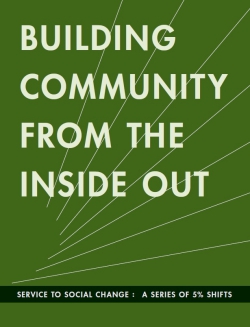May
14
2013

Written by Sean Thomas-Breitfeld
The idea for our new series of Service to Social Change reports came out of the blue. As part of my efforts to get up to speed on my new role at BMP, I read through a stack of transcripts from interviews with long-time partners who had taken steps to align their service delivery practices with their social change principles. I was particularly struck by an interview with Rev. Joan Ross, who founded the Greater Woodward Community Development Corporation, and the story she shared of a meal program at a church in Detroit that stopped serving people in a traditional ‘soup line’ format and instead tried ‘family style’ meals.
The story from Detroit reminded me of my own upbringing in another Midwestern city, Milwaukee, where I often volunteered with my church serving dinner to people and families who didn’t have enough to eat at home. Despite (or maybe due to) the charitable intention, those nights made me feel like part of an assembly line, but instead of Model T’s going down the line, people walked past with arms outstretched as well-meaning volunteers ladled limp vegetables and lasagna onto their plates. The contrast between those volunteer experiences of my youth and the community created by St. Matthew’s and St. Joseph’s Episcopal Church was stark, and reminded me that sometimes the models we adopt from the private sector (like the efficiency of an assembly line) can rob our work of its soul.
This first report tells the stories of how family style meals contributed to a sense of mutuality and sharing in Detroit, and how the efforts of an organization in Queens, New York, built a staff community that exemplified the organization’s values of inclusion and reciprocity. The report includes practical discussion guides and tools for change-agents in organizations who want to adapt what worked in the two case examples to their particular organizations. It also refers to a rich body of social science research on the importance of breaking down isolation and alienation, to build a sense of community. I think that we in the nonprofit sector intuitively understand that building relationships is essential to both changing outcomes for individuals in crisis, and also changing our society; the challenge is translating those deeply-felt goals into programmatic activities and outcomes.
The full series of reports – which will be released over the course of the summer – will highlight similar “5% shifts,” as we are calling them. These 5% shifts don’t require new, major financial investments or outlays. They don’t rely on an organization completely changing course and reinventing itself over night. The shifts we are highlighting are like the small steps that people take to get healthier – like walking upstairs instead of taking the elevator, or eating healthy snacks between meals. The benefit may not be obvious immediately, but as the small shifts take root, the impact is undeniable. We hope that organizations will find these reports intriguing and inspiring, and let us know about your own 5% shifts!

3 thoughts on “Small Shifts, Big Change”
Comments are closed.